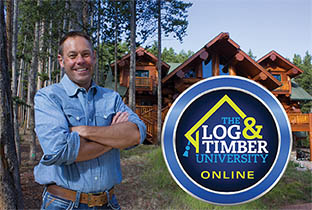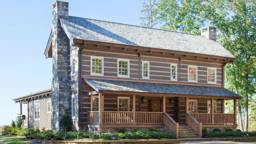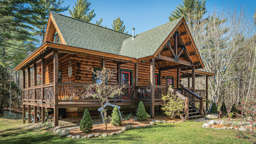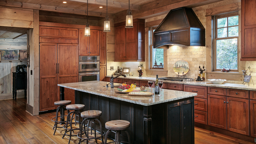
Photo: Tomasz Filipek / Unsplash
Our surveys show that many people who plan to build log homes purchase their land well in advance of buying the home itself. Maybe it's because log home lovers appreciate land as our most important, non-renewable resource and enjoy owning land and living in a country setting. We've seen many attractive log homes in more densely populated, suburban areas, but the majority are built on small acreage in rural or semi-rural settings.
If you don't already own the land on which you intend to build, here are some fundamental considerations in making the selection. Remember that you can change the design of your home a dozen times before you actually build, but once you buy your land you'll live with it for years. The land you choose to build on can have a tremendous impact on the building process and the costs, so good planning here is an important pre-construction activity.

Photo: Gary Ellis / Unsplash
Location
Location is the number-one consideration when buying land. It affects everything from the cost of the land to your home owner's insurance to the eventual resale value of the home. It is also extremely important to your enjoyment of the home in which you hope to live for many years. Take the time you need to purchase land in the location that's perfect for your home. Anything less is simply not acceptable. Here are some basic questions you should ask when buying land for your new log home:
Is the property close to your work, schools, stores, health care and fire protection? It may be a prime location, but if it takes you too long to get to work, you maynot enjoy living there. Homes that are too far from fire protection pay more for fire insurance. This factor is often a complaint from home owners who have built an expensive home far from adequate fire protection.
It is in the "path of progress?" A setting that is rural today could rapidly become urbanized. This change could cause property values to skyrocket, but it could also destroy the reason you like the land today. Check with the county planning board to see if a master plan is pointing growth or industry in the direction of your land.
Is the terrain suitable for the style of home you want? Does it have good drainage? Does it have trees that will not have to be cut to build the house? Check for zoning, code restrictions, development or home owners association restrictions and other legal considerations. Although it doesn't happen often, occasionally there will be restrictions that rule out building a log home. If you see a clause like that, before you buy the land, ask the community's architectural committee if it considers log homes unconventional. Often these restrictions can be overcome by a good presentation to the committee. Once it sees the value and beauty of your home, waivers can be granted.
Check into the cost of utilities. Does your land have access to natural gas? How far are you from electrical service? Sometimes rural electric co-ops will provide service at little cost, but in other locations, you may have to bear all the cost of poles and transmission lines. This expense can run into the thousands of dollars if you are a couple of miles away from the nearest service.
Will the property have city sewer lines or will you have to install your own system? If the land has good percolation characteristics, the easiest way to handle the problem is a septic tank and drainage field. You will have to pay for a percolation test to determine soil conditions, which then determine the size and design of the septic system and drainage field. The number of bedrooms in the home and whether or not there is a kitchen garbage disposal also affect the size of the septic system. If the land does not "perk" satisfactorily, you'll have to install a more expensive system to handle waste treatment.
Does the property have a municipal water supply, or must you dig a well? The cost of a well depends on the depth and substrata that must be drilled through. Well water that contains unacceptable minerals may require expensive treatment equipment to filter it.
Easements are rights-of-way for utilities or services that may pass through your property and prevent building anything on a portion of it. Make sure you know about any easements and other site considerations before you sign a purchase agreement.

Photo: Irina Shishkina / Unsplash
Title
Usually a competent lawyer or title abstractor can quickly and easily review property records at the county courthouse and give an accurate title opinion. In rare instances, rural property titles can be exasperating to clarify. Farm land passed down to a multitude of heirs who live in far-flung places, old surveys based on trees or rocks that may no longer be there, or just the farmer's notion that his land stretched down to a certain creek can cause difficult legal snarls. These situations can be costly to clear up and even more troublesome if you build your home on what turns out to be someone else's land, so be prepared to move on if legal impediments prevent receiving clear title to a certain piece of land.

Photo: Mario Beducci / Unsplash
Cost
Comparing the cost of land can be difficult because of many intangible considerations. Land that is inexpensive up front may require additional money to make it livable. For example, if a parcel of land fails to percolate properly and has no city or public water supply, building a waste-treatment system and digging a well can quickly add several thousand dollars to the price. Under some circumstances, building on a piece of land that is too large or too expensive can be difficult to finance. Most residential mortgage brokers will not finance the purchase of raw land, and they may not finance a home when value of the land is more than 33 percent of the total value of the project. Other financing sources will not work with land of more than one acre, so be sure to coordinate with your financing source the size and cost of the property on which you are planning to build.
When your land is valued too highly, one solution you might try is to survey out a piece of the property to help with the financing of the home building project. Doing so is a very simple process and does not affect your ownership or use of any of the property. This is an option that may even be advantageous if you ever want to sell the home but keep the bulk of the land. In many parts of the United States, the Farm Credit System is a good source of financing. It provides financing on many types of single-family dwellings to qualified home owners living in rural areas with a population of less than 2,500.
See also: How Much Do Log Homes Cost?





_11868_2023-12-20_08-12-256x288.jpg)





